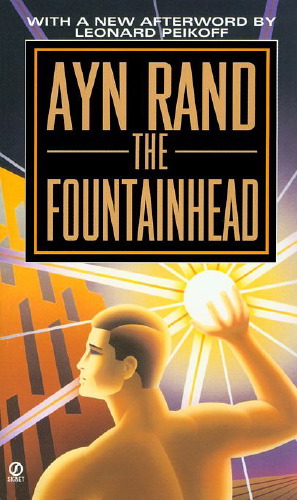 Sometimes things come into your life at just the right time and for me this book was one of them. I started reading at the end of last summer and in the midst of school would pick it up occasionally and chip away at it. It's written by Ayn Rand, author of Atlas Shrugged, a book I read a few years ago and found very relevant. Too me books like these are must reads because they are a huge part of our culture. They are still frequently referenced today and you may have even quoted it without realizing what you were talking about because they are so ingrained in our vocabulary. Therefore, I think The Fountainhead has value to the average reader even if doesn't affect you in the same way it did me.
Sometimes things come into your life at just the right time and for me this book was one of them. I started reading at the end of last summer and in the midst of school would pick it up occasionally and chip away at it. It's written by Ayn Rand, author of Atlas Shrugged, a book I read a few years ago and found very relevant. Too me books like these are must reads because they are a huge part of our culture. They are still frequently referenced today and you may have even quoted it without realizing what you were talking about because they are so ingrained in our vocabulary. Therefore, I think The Fountainhead has value to the average reader even if doesn't affect you in the same way it did me. The book is a novel written in the 1940s by a Russian expatriot living in the U.S., which I think adds credibility to her political commentary, but that is not what struck me in this book. The premise of the book is that selflessness is the ultimate degradation of the human soul. This sounds pretty crazy but when you think about it -- it is so amazingly poignant.
Here is a brief summary of the characters:
Howard Roark is an architect. He is great and therefore has a difficult time breaking into the business because the professional standards are to borrow from ideas of the past. He is the caricature of selfishness in that he builds buildings for his own pleasure, to make the world a better place for himself by having created something that he knows is great. The book chronicles his struggles in finding success in a world that is full of people who are "selfless."
Roark's counterpart is Peter Keating. They start their careers at the same time and Keating immediately rises to the top of the architecture world by becoming popular, meeting the right people and designing buildings that are nothing spectacular but are good enough. By the end of the book Keating is the picture of "selfessness." He has become unrecognizable even to himself because he has sold his soul in the process of trying to become great.
The masses are the third caricature. These people despise greatness because it shows their own ineptitude. The masses are lead by the opinions of others, namely Elsworth Toohey, an architecture opinion column writer. Toohey praises mediocrity in an attempt to destroy greatness and obtain power for himself. He preaches the doctrine of selflessness in terms that are not unfamiliar to us: pity, benevolence, public spirit, social consciousness.
The book follows the interplay of these characters ultimately showing the reader that the selflessness is the great sin. First of all we have to address the definition of selflessness. If you break down the word into parts you see that it literally means a quality of being without self and when this definition is applied to the word I think Ayn Rand is absolutely right. When we are without self we do no service to ourselves or the world around us. We become a waif, blown about by the whims and opinions of others. The self is what makes us unique. It is what makes us alive.
This was especially pertinent to me because for several years I have been trying to become the picture of selflessness. I felt that in order to be a good Christian, to become more like Christ, I had to abandon my desires. My life became an experiment in seeing how much I could possibly let go of, how I could let myself be shaped and changed. Last fall I reached a point where I felt there was nothing left to me. I literally felt as if my opinions, likes and desires, suppressed for so long, had faded away to nothing. The memory of who I had been before seemed distant and unknowable. I feel that I have reached the depth of selflessness and after having been there I never want to go back.
I am thinking that after having my world shaken by medical problems I felt the control I once had on my life was gone. My coping mechanism was to surrender the rest and become a shadow. I now realize that was a great mistake. I have never been a fan of the "finding yourself" rhetoric but I do feel I am now on a quest to find my self.

No comments:
Post a Comment